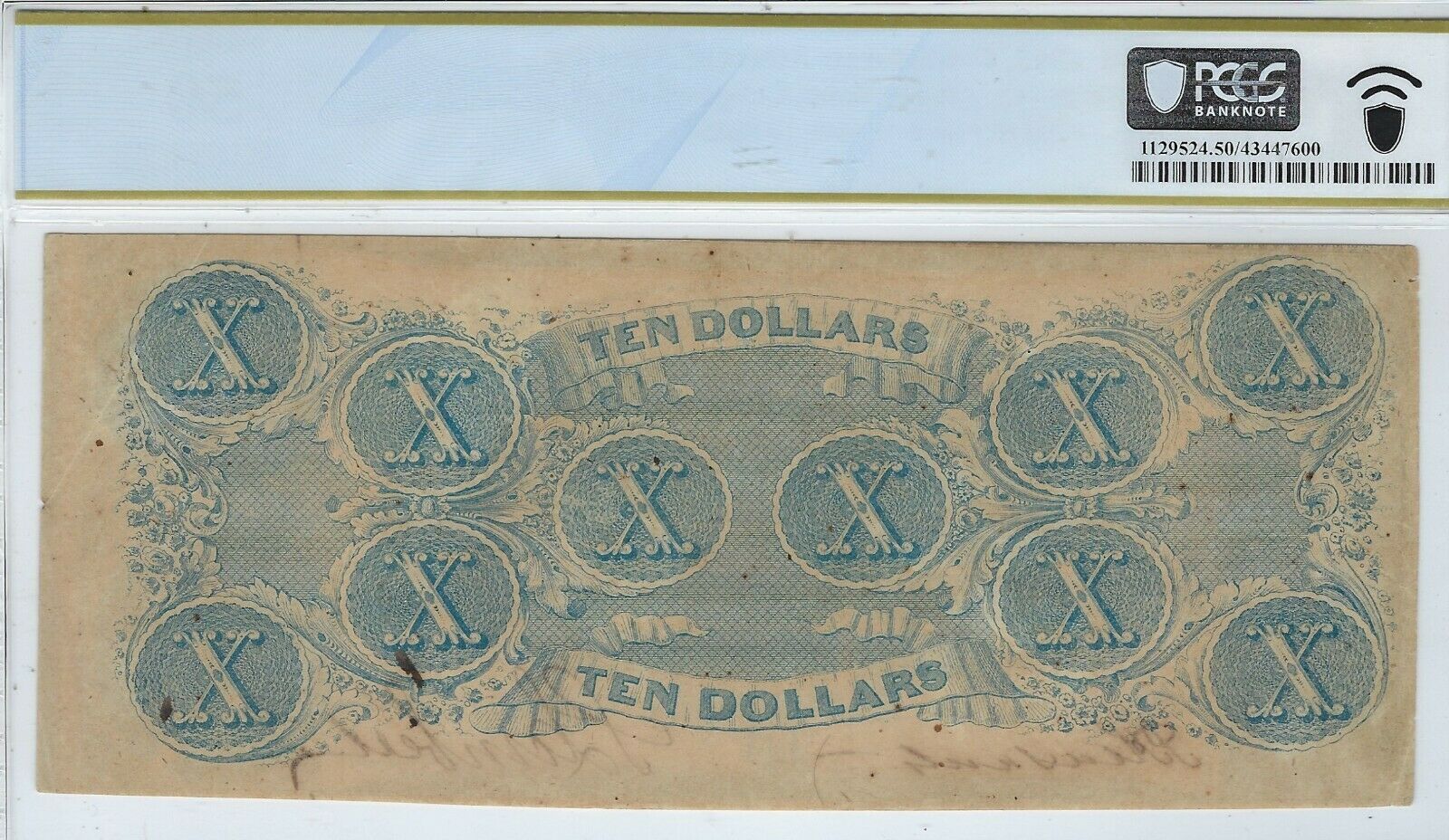-40%
T-59 PF-12 1863 Confederate Paper Money - PCGS-B About Uncirculated 50!
$ 51.74
- Description
- Size Guide
Description
T-59 PF-12 1861 .00 CSA Currency. State capitol proposed for Columbia, S.C. in the center. R.M.T. Hunter to the right.Lithog'd by Evans & Cogswell. 1st Series. Printed on plain paper.
Serial number 25529. Plen D.
PCGS Banknote Grading About Uncirculated 50! Pin hole at upper left edge not mentioned on the holder. Mostly framed! Error cut at right.
Genuine.
The T-59 was printed on white paper and has a back. The center of the note presents a mock up of the proposed state capitol of South Carolina in Columbia. R. M. T. Hunter, who served as Secretary of State for a brief stint as well as a Confederate Senator, is shown at the lower right. The reverse is ornate with the denomination. This note was payable two years after the ratification of a Treaty of Peace between the Confederate States and United States. It also was receivable for all dues except export dues and fundable in 6% bonds within 12 months of issue.
T
his type comes on quality white bank note paper. T-59 is rich with varieties from “series” errors, plate letter mismatches, and includes a number of inverted backs. Most of the T-59 inverted backs are extremely rare. The T-59 also has the rarest Confederate watermark, the J Green & Son 1862 paper, of which there are three known in collectors’ hands and three in museums.
This type is common in most grades except Choice Extremely Fine to Choice Uncirculated.
A note about 3rd party grading. PCGS and PMG do a good job putting a floor on quality within a grade range and have become proficient in detecting repairs (though occasionally they miss something, or see something that is not there, as we all can).
Notes housed in Net or Apparent holders have a wide range of quality from very nice (in rare cases may be nearly choice) to dogs with major problems, so each needs to be evaluated on their own.
However, PMG and PCGS focus on technical grading due to circulation and damage and do not have a mechanism for evaluating condition or eye appeal - whether a note is average, better than average, choice or gem for the grade based on its color, trim and margins. The exception to this are slabbed notes of New or Uncirculated grades to some degree. This is important as Very Fine, Extremely Fine or AU notes can have a wide range of values depending on these factors not reflected in the slab grade. A fully framed Confederate or obsolete note is worth considerably to a lot more than one that is trimmed into the margin for the same grade. Likewise, color is important. These factors can affect the value of a note by 50%, 2-1 or even 3-1, e.g., an AU 58 (PPQ or not) T-20 1861 CSA note trimmed into the margin is worth between 0 and 0. The same grade, AU 58 (PPQ or not), with a full frame and good color/inking is worth something like 0 to 00 depending on eye appeal. I will continue to use the terms plus for above average, choice and gem to mean varying degrees of superiority of condition and eye appeal of a note within a grade as documented in my book which is based on what collectors seek out and pay premiums for.
Pierre Fricke. Immediate Past President of the Society of Paper Money Collectors; Professional Numismatists Guild (PNG); Professional Currency Dealers Association (PCDA); ANA, EAC, etc...
BuyVintageMoney.
Author of the standard guide book to Confederate money - Collecting Confederate Money Field Edition 2014.
Free shipping and insurance.
eBay has announced that it will start to collect sales tax on behalf of sellers for items shipped to customers in Alabama (Jul 1), Connecticut (Apr 1), Iowa (Feb 1), Minnesota (Jan 1), New Jersey (May 1), Oklahoma (Jul 1), Pennsylvania (Jul 1), and Washington (Jan 1). Additional states are being added like Idaho and more than 20 others. This is the new internet tax out of the US Supreme Court Wayfair decision. Buyers are responsible for paying this sales tax.
See eBay information for list of states eBay charges this tax payable by buyers to eBay as part of eBay invoices -- https://www.ebay.com/help/selling/fees-credits-invoices/taxes-import-charges?id=4121#section4










